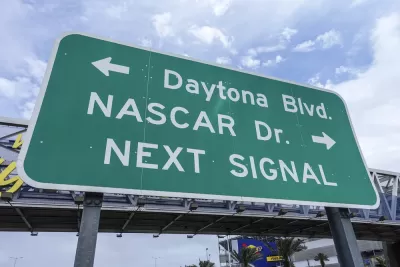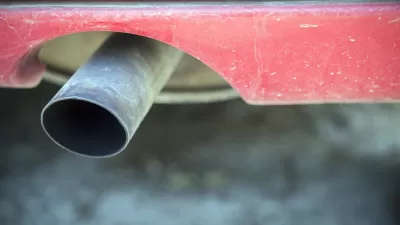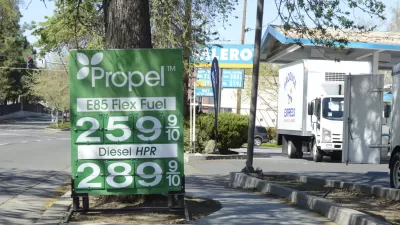Next on President Trump's environmental chopping block may be a rollback of fuel efficiency standards. Two auto associations have asked EPA Administer Scott Pruitt to review a decision made last month to retain a 54.5 mpg target.

Last month the U.S. Environmental Protection Agency ruled on the midterm review of fuel efficiency standards initially set in July 2011 at 54.5 miles per gallon by year 2025, and finalized in August 2012. The ruling affected passenger vehicles for model years 2022 to 2025. EPA rejected the automakers request to relax the standards.
A new administration and an industry-friendly EPA administrator presents an opportunity for the auto industry to try again. On Feb. 22, two major auto associations, the Alliance of Automobile Manufacturers and Global Automakers, wrote separate letters to Environmental Protection Agency Administrator Scott Pruitt to request reconsideration of the midterm review decision.
Mitch Bainwol, president and CEO of the Auto Alliance, issued a statement on the Feb. 17 confirmation of Scott Pruitt as EPA administrator that explains their perspective for asking for a reevaluation.
"The Administrator has a keen understanding of how compliance with the government fuel economy/greenhouse gas program depends on what consumers buy, not what automakers produce. That’s why standards must also reflect market realities."
Due in part to cheap gas and a better economy, American motorists are flocking to sport utility vehicles and away from more fuel efficient cars. As a result, the "sales-weighted fuel economy of purchased [as opposed to manufactured] new vehicles," has remain stagnant at 25.1 miles per gallon for the last three years, according to this graph by Michael Sivak and Brandon Schoettle of the University of Michigan Transportation Research Institute.
"The alliance, whose members account for three-quarters of the U.S. car and light-truck market, warned that if the limits remain in place, they 'threaten to depress an industry that can ill afford spiraling regulatory costs,'" report Juliet Eilperin and Steven Overly for The Washington Post.
Automakers are particularly concerned about the poor sales of electric and hybrid vehicles, which regulators and carmakers alike expected would increase the fuel efficiency of their overall fleet. Those vehicles have made up less than 4 percent of new car sales in recent years, and analysts do not expect that to improve as long as gasoline prices remain low.
“They’re building these vehicles, they’re discounting the hell out of them, and they’re still not moving the needle on sales,” said Michelle Krebs, senior analyst at AutoTrader. “The consumer demand part of the equation is a big challenge.”
A related issue is the ability of California to set its own emission standards, but it's dependent on receiving a waiver from EPA, which Pruitt has indicated during his confirmation hearings is uncertain.
Eilperin and Overly provide in greater detail the case the manufacturers are making for a reevaluation, and why the Trump administration would appear to be sympathetic to their request.
On Feb. 21, Eilperin and Steven Mufson reported for The Post that President Trump is planning to use executive orders to roll back several of former President Obama's major environmental achievements, including the Clean Power Plan, Waters of the United States rule, and a moratorium on leasing of coal mining on federal lands.
FULL STORY: Automakers ask EPA to overturn recent review of fuel-efficiency standards

Alabama: Trump Terminates Settlements for Black Communities Harmed By Raw Sewage
Trump deemed the landmark civil rights agreement “illegal DEI and environmental justice policy.”

Study: Maui’s Plan to Convert Vacation Rentals to Long-Term Housing Could Cause Nearly $1 Billion Economic Loss
The plan would reduce visitor accommodation by 25% resulting in 1,900 jobs lost.

Planetizen Federal Action Tracker
A weekly monitor of how Trump’s orders and actions are impacting planners and planning in America.

Wind Energy on the Rise Despite Federal Policy Reversal
The Trump administration is revoking federal support for renewable energy, but demand for new projects continues unabated.

Passengers Flock to Caltrain After Electrification
The new electric trains are running faster and more reliably, leading to strong ridership growth on the Bay Area rail system.

Texas Churches Rally Behind ‘Yes in God’s Back Yard’ Legislation
Religious leaders want the state to reduce zoning regulations to streamline leasing church-owned land to housing developers.
Urban Design for Planners 1: Software Tools
This six-course series explores essential urban design concepts using open source software and equips planners with the tools they need to participate fully in the urban design process.
Planning for Universal Design
Learn the tools for implementing Universal Design in planning regulations.
Caltrans
Smith Gee Studio
Institute for Housing and Urban Development Studies (IHS)
City of Grandview
Harvard GSD Executive Education
Toledo-Lucas County Plan Commissions
Salt Lake City
NYU Wagner Graduate School of Public Service




























